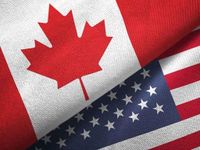In a striking turn of events, Canada’s reliance on the United States is expected to deepen despite ongoing efforts to diversify its trade relationships. This forecast comes from CIBC economist Benjamin Tal, who argues that the country will emerge more dependent on its southern neighbor following the conclusion of tariff negotiations.
On April 9, 2025, U.S. President Donald Trump escalated his global trade war, particularly against China, by announcing a 90-day reprieve on higher tariffs imposed on various countries. However, he simultaneously raised tariffs on China to a staggering 125 percent as a retaliatory measure. Tal pointed out that Canada’s geographical proximity to the U.S. plays a significant role in its trade dynamics. “If you have a Cold War trade war between China and the U.S. and you’re Canada, where do you go? There are many issues that make the choice clear,” he noted, emphasizing that geography and existing trade relationships heavily influence Canada’s economic decisions.
Despite Canada signing 15 trade agreements with 51 countries over the years, Tal observed that trade with the U.S. has only increased. “To diversify our export machine away from the U.S., we have the 15 free trade agreements, and our dependence on the U.S.A. went up despite all that,” he explained. The ongoing negotiations for a new Canada-United States-Mexico Agreement (CUSMA) are expected to further entrench this dependency, as Tal predicts the U.S. will push Canada to increase its purchases of American defense products and natural gas.
Amidst rising tensions, Canadians have expressed frustration over Trump’s tariffs on Canadian steel, aluminum, and automobiles. Liberal Leader Mark Carney has capitalized on this sentiment, asserting that Canada must seek new economic ties globally. “The system of global trade anchored by the United States that Canada has relied on since the end of the Second World War is over,” Carney stated on April 2, 2025. He urged Canada to actively strengthen trade relationships with “reliable” countries to protect its sovereignty and economic interests.
However, Tal remains skeptical about the feasibility of reducing dependence on the U.S. He argues that the interconnectedness of the two economies, bolstered by infrastructure and cost considerations, will ultimately prevail over national aspirations to diminish trade ties. “When you talk to people in the field, you realize that it’s not so easy to do,” he remarked, suggesting that Canada will likely find itself sourcing more from the U.S. rather than less after the CUSMA negotiations conclude.
In terms of tariffs, Tal anticipates that if Canada secures a new deal on CUSMA, the final tariff rates will be relatively low, likely in the range of five to seven percent, with some sectors, such as energy products, potentially exempted altogether. “Five years from now, we will wake up and realize that our dependence on the U.S. has risen, not fallen,” he warned.
In a related economic development, stock markets reacted positively to Trump’s announcement of a temporary pause on tariffs, which provided a glimmer of hope amid ongoing trade tensions. The S&P 500 index surged by as much as 8.3 percent, with nearly all companies gaining ground. Art Hogan, chief market strategist at B. Riley Wealth, pointed out that the 90-day reprieve allows for more significant negotiation time, which is what the market craves.
Meanwhile, new travel statistics reveal a notable decline in the number of Canadians returning from the United States. According to Statistics Canada, the number of Canadians making return trips by car dropped by nearly 32 percent in March 2025 compared to the same month last year. This marks the third consecutive month of year-over-year declines in cross-border travel by car. Additionally, air travel from the U.S. to Canada also saw a decrease of 13.5 percent.
Observers attribute this decline in travel to several factors, including the weak Canadian dollar and rising discontent over Trump’s trade policies and comments regarding Canadian sovereignty. Interestingly, while return trips from the U.S. fell, travel from other countries increased by about nine percent during the same period.
In light of these developments, Canada has updated its travel advisory, warning residents that they may face heightened scrutiny from U.S. border guards and the possibility of detention if denied entry. This advisory underscores the growing tension in U.S.-Canada relations and the impact of political rhetoric on everyday interactions between the two countries.
As Canada navigates these complex trade and travel dynamics, the interplay between economic dependence on the U.S. and the desire to forge new international relationships will continue to shape the nation’s economic landscape. The coming months will be pivotal as negotiations unfold and the implications of recent policy changes become clearer.






